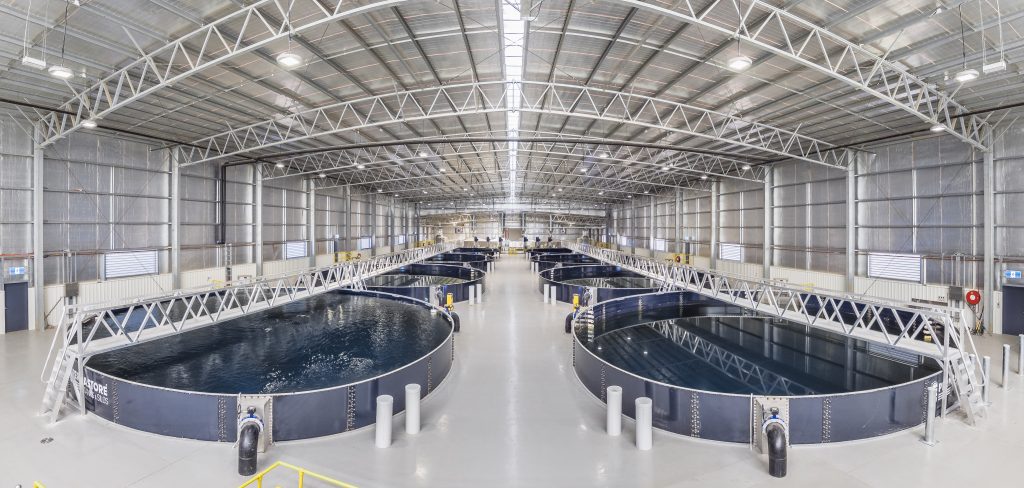
Features
Education
Highlights: 2021 RAS Virtual Summit
The online conference will be back in October 2022
February 1, 2022 By Jean Ko Din
 Photo: JLH Consulting
Photo: JLH Consulting Telling a compelling food story is a game changer.
Jennifer Bushman’s keynote at last November’s RAS Virtual Summit said good storytelling could be the missing piece that connects recirculating aquaculture to the average consumer.
“In order for us to really have that stake in the ground as recirculating aquaculture system (RAS) producers, or any aquaculture system for that matter, we have to figure out a way to create connection,” said Bushman, during her virtual presentation on Nov. 3, 2021.
The RAS Virtual Summit 2021 was part of a larger virtual event series called the RAS Connector Series. The event was hosted by RAStech magazine, along with Hatchery International and Aquaculture North America.
The RAS Virtual Summit 2022 will take place on Oct. 5.
The medium is the message
“Often times, when I’m asked to speak at (industry events), there’s a lot of focus on the technology… but when was the last time you were at a farmer’s market or a grocery store, and thought about the technology that got our food there,” said Bushman.
Bushman is a strategic development consultant for the Sustainable Aquaculture division of Route to Market LLC. She has more than a decade of experience in building marketing programs for aquaculture producers, like Kvarøy Arctic, Riverence Trout, and Pacifico Aquaculture.
Conversations around the people and the journey of the fish to the consumer’s plate is often missed in the industry’s messaging. With a virtual audience of about 120 attendees, Bushman shared her experience building a brand with a sense of place and mission of sustainable food production.
“Consumers don’t want to think of themselves as consumers on a planet that is being overconsumed,” she said. “They want to think that it’s a contribution to something better than themselves. And when they do, they will spend more, they will value it more and they will dig more into what it is that you’re doing.”
Going vertical
With supply chain concerns continuing into 2022, Martin Gardner shares the story of how Blue Ridge Aquaculture became the world’s largest indoor RAS tilapia producer.
As vice-president of business development, Gardner shared the company’s journey in creating a fully-integrated system that includes broodstock, hatchery, nursery, growout, distribution and an on-site aquafeed mill. Its latest project is upgrading and expanding its RAS nursery at Blue Ridge’s 30-acre facility in Ridgeway, Va.
“We had to integrate because we simply had to,” he said.
Over the years, Gardner said the high frequency of Blue Ridge’s transactions made them vulnerable to too many risks. He shared the example of the company’s decision to build their own feed mill in 2017.
“Some of these better feed mills were targeted by pet food companies and pushed us out,” he said
Changes to feed formulations can have a large impact to a RAS. Blue Ridge Aquafeeds allowed the company to secure their feed supply and the quality diet that its operation needs.
The future of feed
The conversation around RAS feed continued later in the day with a live Q&A session with fish nutrition experts – Dr. Delbert Gatlin III, regents professor at Texas A&M Univeristy and Marc Turano, nutrition and technology lead at Cargill Aqua Nutrition-North America.
The panel, which was moderated by Freshwater Institute research scientist, John Davidson, focused on today’s major feed trends and how these trends can potentially change in the future.
Both Gatlin and Turano agreed the biggest trend that cuts across all sectors of the aquaculture industry is finding the alternative protein and lipid ingredients that will relieve pressure from fishmeal production.
“The activities now that are helping refine and ramp up the production of these novel ingredients to make them more cost-effective is extremely important,” said Gatlin, who has more than 35 years of experience researching nutrients and diets in a wide range of aquactic species.
From the perspective of a major feed producer, Turano acknowledges the RAS industry’s interest for Cargill to make large amounts of system-friendly feed more widely available.
However, RAS continues to be a niche market that can differ between facilities. Turano said it’s difficult to cater to the unique needs of recirculating aquaculture.
Print this page